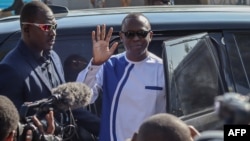Chad’s military leader has appointed a former opposition leader and pro-democracy figure, Success Masra, as prime minister in a newly-appointed transitional government. Opposition and civil society groups are skeptical that Masra, who recently returned from exile, can convince military ruler Mahamat Idriss Deby to give up power. But Marsa says his appointment does not stop him from making sure Chad carries out elections later this year and returns to civilian rule.
Mahamat Ahmat Alhabo, secretary-general of Chad’s presidency and a close aide of military ruler General Mahamat Idriss Deby, reads the names of members of a new government.
Alhabo says the new government, who he says will prepare Chad for return to civilian rule, was named after consultation with former opposition leader Success Masra, whom Deby appointed as Chad's transitional prime minister on Monday.
Masra replaced Saleh Kebzabo, a Deby appointment who served as prime minister for 14 months.
On Sunday, Deby said he had accepted Kebzabo’s resignation following the adoption of a new constitution. Last week, Chad's Supreme Court approved the results of a referendum in which 85% of Chadians voted in favor of the new document.
Neatobei Bidi Valentin is president of the N’djamena-headquartered African Party for Peace and Justice.
He says he does not believe Mahamat Idriss Deby consulted with Masra before naming and installing a new government of 41 members on Tuesday... Neitobei says before the new prime minister and his government were appointed, civil society and the political opposition, including Masra, asked Deby to reduce Chad's government of transition by half.
Neitobei said a majority of the members of the transitional government appointed by Deby are the military general’s family and friends.
Chad's civil society groups say Masra and a few former opposition members in the new government will not be able to stop the military ruler from illegally continuing his family's autocratic rule.
Deby's father, Idriss Deby Itno, ruled Chad for three decades before dying in April 2021 on the frontlines of a fight against northern rebels.
The younger Deby was to head a transitional council but on October 8, 2022, he dissolved the council and declared himself interim president.
Masra led thousands of civilians in street protests against what he called Deby's iron fisted-rule and his attempts to continue his father's dynasty.
Rights groups report that security forces killed 50 people, injured 300 and arrested several hundred during the protests.
Masra fled to the United States through neighboring Cameroon but returned on November 3 after he reached an agreement with Deby. Civil society groups say they were surprised when Masra started urging voters to take part in the constitutional referendum, which opposition groups called a sham to extend Deby’s rule.
Chad's opposition says by accepting the prime minister’s post, Masra has dashed the hopes of a majority of civilians who counted on his popularity to force the military junta to step aside.
Masra says his appointment does not stop him from pressing for democratic elections for a return to constitutional order.
He says his immediate task is to convince teachers who have been refusing to work since October 2023 in protest of difficult working conditions and poor salaries. He says teachers should return to classrooms and work while he prepares a national dialogue with teachers, because children's education is a fundamental human right and Chad's government priority.
Masra said he will make sure living conditions of civilians are improved and the current fuel shortage is eased before the country holds elections in October of this year.
The 40-year-old former opposition leader also says he will work closely with Deby to make sure the general amnesty granted to all civilians and military arrested during the October 2022 protests is fully implemented.







